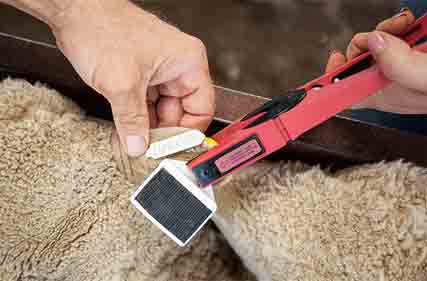 AWI smart ear tags are being tested on a large commercial wool-growing property near Barcaldine to see if they can withstand the tough conditions of western Queensland.
AWI smart ear tags are being tested on a large commercial wool-growing property near Barcaldine to see if they can withstand the tough conditions of western Queensland.
Researchers are using the ear tags to develop alerts that detect animal health and wellbeing issues faced by sheep.
AWI’s smart ear tags aim to enable woolgrowers to track, monitor and assess the status of their flock in real time – and make more informed decisions to increase their enterprise’s profitability.
AWI has partnered in a project with CQUniversity in an Advance Queensland Industry Fellowship to test the AWI smart ear tags in real life situations faced by woolgrowers. CQUniversity researchers will assess the robustness of the ear tags and their ability to help woolgrowers detect key issues such as wild dog predation and disease detection.
In previous smaller trials, the smart ear tags have demonstrated an excellent ability to increase the level of livestock monitoring and thereby potentially increase profitability, but it is important that the ear tags can withstand the harsh conditions faced in trials on larger properties in regional Australia.
‘Dunraven’ near Barcaldine in Central West Queensland is a 25,495ha sheep and cattle station and is the first property in the state to take part in the research. CQUniversity lead researcher on the project Dr Jaime Manning visited Dunraven in November with a small team to fit the ear tags to a mob of sheep and install the tag readers.
Dr Manning said the first year of the trial is about collecting data on tag robustness or how well the tags stay in the ear and to monitor the solar panel that powers the tag.
“One of the biggest challenges is the difficult environment our commercial sheep grazing systems face in terms of remoteness, terrain and topography,” Dr Manning said.
“We therefore need technology that can survive in this harsh environment, but that is also capable of providing us with information on individuals when there is limited connectivity.
“After deploying the AWI smart ear tag, we now have access to real time information on individual sheep at Dunraven. This is a massive benefit for our producers to have the ability to monitor their sheep, without having to go out in the paddock.”
This project is aimed at developing algorithms which can provide early warning alerts of changes in sheep behaviour ahead of wild dog predation or disease events. This will enable producers to detect and manage problems well before they turn into more significant issues. A key benefit of the sensors is that they monitor sheep activity, behaviour and health 24 hours a day, seven days a week.
